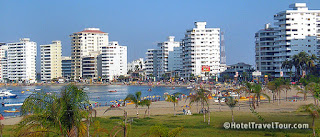Are you thinking of retirement lifestyle
abroad? Dwindling pension
benefits are forcing many Canadians to rethink how they’ll spend their golden
years, but that doesn’t necessarily mean giving up their dreams of a sun-soaked
retirement. Some experts say that with proper planning, uprooting to an exotic
locale can actually help cash-strapped seniors stretch their retirement dollars.
Here
are a few of the advantages & disadvantages to consider. Most people
feel that the perks outweigh the pitfalls!
PERKS
Climate
For most people, the main advantage of retiring abroad is a more moderate climate, which may include southern Europe, the southern states of the USA (e.g. Arizona, California and Florida), Central and South America, the Caribbean and the southern hemisphere in general (e.g. Australia, New Zealand and South Africa) The advantages of living in a warmer climate usually result in an improved quality of life and often an increased life expectancy for retirees. A better climate also provides ample opportunities to enjoy outdoor activities, such as gardening, golf, tennis or walking, during your increased leisure time
Lower taxation
Some countries provide generous, tax-free concessions for retirees, while others have considerably lower tax bills than
Lower cost of living
Many popular retirement countries have a relatively low cost of living, often considerably lower than North America or northern
Higher standard of living and better quality of life
If your retirement destination has favorable tax rates or concessions and a low cost of living, the chances are that your standard of living will rise proportionately. When this is added to the benefits of a warmer year-round climate, your quality of life will also improve significantly.
Lower property prices:
Property prices in North America and northern Europe (and in most of the world's capital cities) have risen considerably in recent years, and many people find themselves caught in a spiraling property market, unable to buy a home that represents good value for money. In contrast, many popular retirement countries offer affordable homes and in some real bargains can be found. You may be surprised to discover that for the price of a small apartment in
Increased leisure and sports options:
The availability of a wide range of leisure and sports activities at an affordable cost is an added attraction of many popular retirement destinations. Most have excellent leisure facilities, such as golf and tennis clubs, with affordable membership prices.
Pitfalls
Being Away From Family
For many, the main disadvantage of retiring abroad is the separation from family and loved ones, particularly from grandchildren who have a habit of growing up fast. This barrier can be reduced by keeping in touch regularly by phone (many countries now offer inexpensive international calls), by e-mail/Skype (most countries provide widespread Internet access) or by choosing a country within easy travelling distance of your home country.
Culture Shock & Language Problems
Many retirees underestimate the cultural isolation that you can feel living abroad, particularly if you're planning to move to a country with a different language where you will have few compatriots. Many people find that coping with retirement and the lack of structure to life without a daily work regime is made doubly stressful by the sense of isolation (and possible frustration) created by a new culture and language. Are you prepared to be in a minority and to be treated as a foreigner? Are you open to different ways of doing things? Do you make friends easily? Can you cope with a much slower pace of life and a high level of bureaucracy? Culture shock can be significantly reduced if you retire to a country with an established expatriate community, as there is in most popular retirement destinations.
Boredom & Isolation
Although most people look forward to retirement, many find the reality of not working difficult and the prospect of full-time leisure daunting. The question of 'what are you going to do all day?' can become difficult to answer - even more so abroad, where there may not be the same facilities and familiar leisure activities that you have in your home country. You may miss your social life back home and find it difficult to be accepted into (or to accept) your new expatriate or 'native' community. It's advisable to visit your prospective retirement destination a number of times at different times of the year and to rent a property before buying a home and making a long-term commitment.
Financial Problems
Without careful planning, retirement abroad can involve financial problems, such as those caused by exchange rate fluctuations, poor investments and possible loss of pension indexation. Tax and cost of living benefits may also turn out to be lower than originally thought.
Immigration Laws
Some countries have strict immigration laws regarding the status of foreigners and how long you can remain there at a time. You may find that you cannot stay longer than six months or that a retirement visa isn't indefinite, which can heighten your insecurity. Some countries impose high permit and visa fees or require that you meet certain, usually financial, criteria.
Old Age & Infirmity
Before planning to live abroad you should consider how you would cope if your mobility was restricted. Many countries have inadequate facilities and support for those with disabilities, and social services may provide little or no help for the elderly and infirm. Another consideration is the provision of retirement homes or sheltered accommodation, which are either non-existent or in their infancy in many countries, and even when available places may be in short supply.
Research
Do
as much research as possible on your prospective retirement destination. I am also here to
help with any of your questions and concerns before making your big retirement
move.
I
also suggest checking out Government of Canada Site









